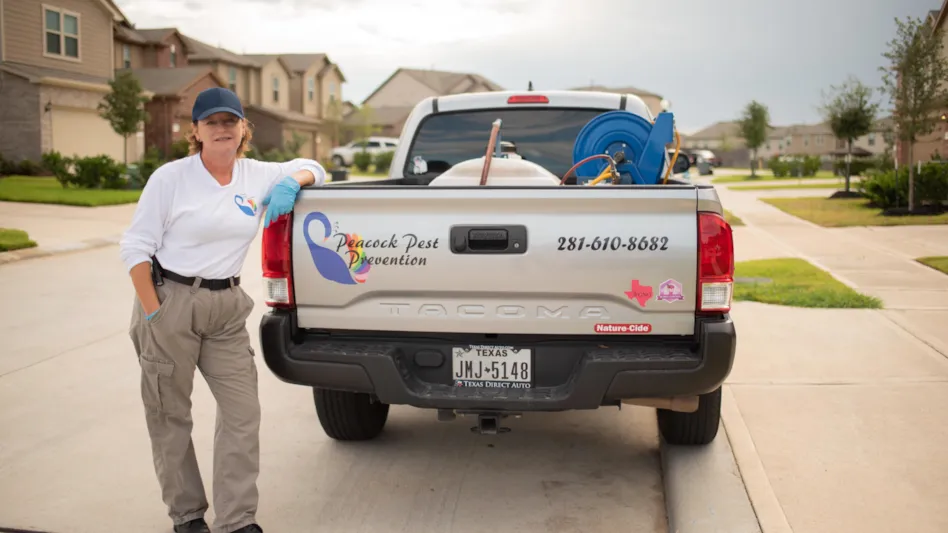
Courtesy of Lisa Botts
HOUSTON, Texas — Lisa Botts, owner/operator at Peacock Pest Prevention, Houston, Texas, started her women-owned pest control business seven years ago with the intention of making her customers and employees feel like family and create a unique customer service experience, she said.
Coming from a larger, corporate pest control company, and starting from scratch with her business, Botts said she started to join different Facebook groups to ask questions about pest identification and business practices.
Seeing the benefits, Botts and Bobbie Terry, owner of The Bug Lady in Austin, Texas, started the Women in Pest Control group to create a more inclusive environment for women in the pest control industry to feel comfortable asking questions and being a part of a community in a male-dominated field, she said.
“We got to about 600 members and about that point in time, most of them were in Texas,” she said. “Women have a hard time finding uniforms that fit and finding good quality boots with steel toes that are designed for women, and these are things we can talk about in this group, openly and honestly without fear.”
The Women in Pest Control Facebook group now has about 1,800 members. In 2019, Women in Pest Control met face-to-face for its first conference. More than 100 women from across the country attended to hear from women speakers and vendors.
The COVID-19 pandemic halted the conference for a few years; This year the group got together for the Women in Pest Control conference from Feb. 29 – March 1, in Austin, Texas. Botts said this conference was “the best one yet.”

The Women in Pest Control organizers also award a grant to a woman who’s starting their own business to show community support and guidance from experienced pest control operators.
“We give them a full year of mentorship from Bobby and I,” Botts said. “We help them build protocols and all of the vendor representatives who are at the conference donate things to that grant winner.”
Botts said although she decided to step down as the event coordinator, more women are stepping up to bring innovative and new concepts to the group to draw more women from the industry to join.
“The idea is we're going to start doing a digital quarterly newsletter, and getting that out to everybody, Bobby is looking for representatives from each state to organize events in their states,” she said. “We want to work very closely with NPMA to make sure that we're working with their [women-based] organizations as well.”
A Family Affair.
Botts works directly in the field, her husband alongside running a full route and her daughter working in the office. For her other technicians, Botts prioritizes flexibility and a work-life balance, which she said makes working for Peacock Pest Prevention more valuable in today’s culture.
“Why shouldn't we be flexible with our employees? That's what I what I really love about this job,” she said. “It's easier to attract younger workers when you can be flexible like that, because there's a work life balance that the young generation is really big on, and a lot of employers are having a hard time with that.”
Botts gets most business leads from word-of-mouth reviews and in-person networking.
“I think building relationships is the No. 1 way to grow your business,” she said. “I have a particular target market because I'm looking for the greener, more concerned-with-the-environment kind of client who's willing to pay a little bit more to have that comfort.”
Peacock Pest Prevention does 75 percent residential and 25 percent commercial pest control work. Botts said pest pressure in the North Houston market consists of rodent work carrying most of their full-time work.
“It does pick up a little bit more in the wintertime with rodents trying to find a place to hang out,” she said. “We used to do mosquito work eight months out of the year, but we have a lot of clients who have gone to all year.”
Latest from Pest Control Technology
- Orkin Helps Local Youth Sports Program Design a ‘Killah’ New Logo
- ABC Home & Commercial Services Celebrates 75 Years in Business
- NPMA Academy Announces Full Schedule
- Truly Nolen Promotes Marchello, Christopherson and Bolton to Managerial Positions
- TruGreen Announces 2024 List of Top 20 U.S. Buggiest Cities
- Why PMPs Use Rodent Bait Stations
- NPMA’s Women’s Forum Encouraged Female Leadership, Growth Opportunities in Pest Control
- GoPest Expands to Birmingham and Huntsville (Ala.)





